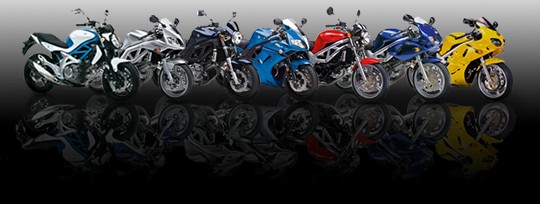 |
 |
| Bikes - Talk & Issues Newsworthy and topical general biking and bike related issues. No crapola! Need Help: Try Searching before posting |
 |
|
|
Thread Tools |
|
|
#11 |
|
Guest
Posts: n/a
|
Could someone confirm the mechanics of this?
Sid where are you... Is it good or bad? |

|
|
|
#12 | |
|
Guest
Posts: n/a
|
Quote:
In fact, many people have commented on the smoothness of my gear changes on the videos I have done, all of which exclude the clutch. Obviously what works for one doesn't work for everybody. As for the wear, well I guess that's possible, but like I said, it's never affected any of my bikes, and that GSXR must be getting close to 30k now, and Greeno's not had any gearbox problems that I'm aware of. . |
|

|
|
|
#13 | |
|
Guest
Posts: n/a
|
Quote:
|
|

|
|
|
#14 |
|
Guest
Posts: n/a
|
to clutchless upshift, put slight pressure on shifter, roll back on throttle ever so lightly, this will unload tranny, the pressure of your foot will pop it right into the next gear
using clutch to shift will NOT make clutch wear any faster, clutchless shifts are not smoother, if they are for you, you don't know how to properly use a clutch clutchless downshifting is a little trickier, but similar, instead of rolling off throttle, you have to give is a "little" blip it's a good skill to be able to clutchless shift (as I found out a couple weeks ago) in the event you break a clutch cable, especially the clutchless downshifting there is no advantage to clutchless shifting, in a drag race in might give you a .05second advantage, or it might not don't be afraid to slip clutch, SV has wet clutches and it won't hurt a wet clutch clutchless shifting will not hurt a SV transmission, it's a constant mesh transmission, which is the reason you can so easily clutchless shift |

|
|
|
#15 |
|
Guest
Posts: n/a
|
Guys, (sorry and girls)
This is very very simple, clutchless up changes will not do any harm to your gearbox, if performed well. As most experienced readers will tell you, they are best for getting a move on, because you spend more time on the gas. Downchanges are really not advised. As someone said the main reason being that you can feed the clutch in and feel how much the engine braking is going to effect the back wheel traction. |

|
|
|
#16 |
|
Guest
Posts: n/a
|
As far as i'm aware clutchless up shifting does not cause any extra wear.
I only really do it when i'm riding at a faster pace though |

|
|
|
#17 |
|
Guest
Posts: n/a
|
Is there any real point to this for road riding? Or is it like knee-down antics? Great for the track but no real use for the road. I'm not having a dig, I really want to know. My friend says my gear changes are lightning quick yet still smooth so I've never seen the point. He does it all the time and I was once on the back of his gixxer 750, let me tell you clutchless felt and sounded bad..........vroooom, grind, bang, vrooooooom. Poor gearbox.
|

|
|
|
#18 |
|
Guest
Posts: n/a
|
i used to always shift up the box without the clutch on IL4's but i find the sv smoother with the clutch, and evan using the clutch i aint no turtle.
|

|
|
|
#19 | |
|
Guest
Posts: n/a
|
Quote:
. |
|

|
|
|
#20 | |
|
No, I don't lend tools.
Mega Poster
Join Date: Jul 2003
Location: Skunk Works, Nth London
Posts: 8,680
|
Quote:
It depends...mainly on the specific technique used. A well executed clutchless change puts no more wear/stress/load on anything, and clearly puts less wear on the clutch, 'cos you didn't use it. Upchanges: There are several ways to do it, all essentially similar, differing only in detail and by the advantage they may give, (if you get it right that is). Fastest change, used as if you're on a timed quarter, (ie drag racing): Preload the lever firmly, roll out the throttle *just* enough for the dogs to be unloaded and the change to occur. With practice (ie lots of time on the strip), this can be a lightning fast change, the gear will go through very quickly, the time taken from on, to off, to on throttle is where the practice/skill lies, the further out you roll the throttle the longer it takes, the less you roll it out the harder the gear change is which takes longer too. Downside: Wear, on everything, forks/grooves/pins/drum/dogs the lot, can be worth lots of time though, (relatively speaking, in a quick quarter), that said, as long as you don't make a constant habit of it, you won't break anything that quickly. Lazy change, changing gear smoooooothly and unhurriedly just exactly like you would with the clutch, only...without: Roll throttle out, lift gear lever, roll throttle back in again. If you do it right this change can be smoother than a cashmere codpiece, what you're looking for is for there to be no 'jerk' in the drive, bit of practice though and anyone can do it, the trick, (if there is one), is to only drop the throttle out to the point at which you would need it to be so that in the next gear you would neither be accelerating or decelerating from the speed at which you initiated the change, thus allows all the bits and pieces to be revolving at as near the same speed as possible thus they mesh together as imperceptibly as possible. Downside: None, if you get it right, which isn't hard. Won't win you any drag races though. Downchanges, Bit different this, similar principle to lazy change, that is: Smooooth. First some things to know: No matter what gear you're in, when the engine isn't running the speed of everything is nil, (yeah I know, blindingly bloody obvious, but hold that thought), that is; all the same speed. Using convenient figures, say that at 10,000rpm 1st gear makes the output shaft of the gearbox revolve at 1000rpm, 2nd 2000rpm, 3rd 3000rpm etc. Knowing this it can easily be seen that the faster the engine speed is, the further apart, relatively speaking, the speeds of the gearbox parts are. At 10,000rpm the relative speeds are 1000rpm apart, at 5000rpm 500rpm apart, at tickover (say 1000rpm, easy numbers see? I like that), the relative speeds only differ by 100rpm. A smooth change occurs when the various bits that need to mesh are revolving at as similar speeds as is possible, in practice the slowest that you can run the engine is tickover, if you were to change down clutchless at as close to tickover as possible the relative parts would be as best speed matched as is possible. If you were to add the slightest smidgeon of throttle just as you go to change, this would unload the 'box and make the change easier, also it would speed the drive into the gearbox up a bit, such that it would be running at the slightly higher speed that the lower gear would demand to run at the same speed, just as in the the lazy change above. Downside: Not easy to get right, and basically no advantage anyway, save for a useful technique to have when the clutch cable breaks at an inconvenient time, I have done several hundred miles like this, getting neutral while still rolling makes all the difference.
__________________
If an SV650 has a flat tyre in the forest and no-one is there to blow it up, how long will it be 'til someone posts that the reg/rec is duff and the world will end unless a CBR unit is fitted? A little bit of knowledge = a dangerous thing. "a deathless anthem of nuclear-strength romantic angst" |
|
|
|

|
 |
|
|
 Similar Threads
Similar Threads
|
||||
| Thread | Thread Starter | Forum | Replies | Last Post |
| Gear change problem-can't get past 2nd gear | muzikill | SV Talk, Tuning & Tweaking | 8 | 14-03-10 10:10 PM |
| Clutchless gear changes | Larry | SV Talk, Tuning & Tweaking | 13 | 12-04-07 02:35 AM |
| Clutchless Gear Changes? | sweepdoggydog | Bikes - Talk & Issues | 21 | 16-08-05 03:14 PM |
| Clutchless up gear changes are jerky-what should I be doing? | thor | SV Talk, Tuning & Tweaking | 8 | 03-06-05 01:51 PM |